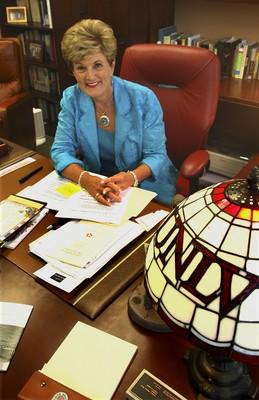UNLV think tank takes plunge into literary world
Carol Harter's vision for UNLV's first think tank could include a quintessentially "Vegas" feature:
Vacation packages.
The University of Nevada, Las Vegas' former president believes events at the Black Mountain Institute could become a tourist attraction.
"You do (Black Mountain Institute) one night, and 'Spamalot' ... the next," she said, referring to the comedy show at Wynn Las Vegas.
Whether tourists want to watch Nobel laureates such as Wole Soyinka and Derek Walcott discuss poetry or authors such as Toni Morrison reflect on current events, Harter is getting creative and seeking national attention for the institute.
After its first year, the think tank of writers and poets has expanded to include a literary publication, another City of Asylum writer and three more fellows for the upcoming academic year.
It all makes for a promising start for the Black Mountain Institute, which is hoping to eventually compete for attention with national think tanks such as the Brookings and Hoover institutions.
Las Vegas' third City of Asylum writer, Iranian fiction writer Moniro Ravanipour, will have an office at the institute.
Four other cities make up the North American Network of Cities of Asylum, which harbors and funds writers who are facing political persecution in their native countries.
Ravanipour, who has published eight books in Iran, is fleeing persecution in that country for speaking out against its regime.
Among the three new fellows, who will all be working on a novel or project at the institute during the fall semester, perhaps the best-known is American author Tom Bissell.
Bissell received critical acclaim for his latest book, "The Father of All Things: A Marine, His Son, and the Legacy of Vietnam," which was released in March.
Donors also gave $50,000 each to support Jamaican author Donna Hemans and Penn State English professor and writer Josip Novakovich.
The Black Mountain Institute also expects to gain a national audience with its purchase through $60,000 in donations of "Witness," an acclaimed literary journal from Oakland Community College in Michigan.
"Witness," which Harter said is distributed internationally, has been described as one of the best literary publications in the country by top authors.
UNLV graduate students in literature will sit on panels sifting through submissions to the journal and recommending items to Harter and others at the institute, who will decide what will be published.
The institute will publish its first issue of "Witness" in the fall, and eventually the journal will grow to include more submissions by authors sponsored by the institute.
Unlike Brookings in Washington, D.C., and Hoover at Stanford University in California, Black Mountain doesn't exist in an intellectual environment, Harter said.
"In Las Vegas ... there's a lack of real intellectual debate in the public sense," Harter said.
"We're pushing against type, there's no question," she added.
To some people, locating a think tank in Las Vegas would be a detriment. But Harter plans to use the city to the institute's advantage in areas ranging from fundraising to attracting top scholars.
The Harrah's Foundation, for example, has also offered to pay for food and rooms for the UNLV institute's visiting speakers, Harter said.
And while some intellectuals and scholars are turned off by the "Sin City" image of Las Vegas, Harter said their fascination with the place eventually gets the best of them.
"At first, they may be shocked a little bit at the notion of it; but when they think about it, everybody wants to come to Las Vegas," she said.
Several of the institute's events have shown what Harter sees as a pent-up demand for different types of entertainment.
For Morrison's speech in 2006, for example, 2,200 free tickets were snapped up in the first 24 hours, and the fundraising event tied to it drew $200,000 in donations, she said.
Most of the institute's budget, which includes funding for a handful of staff members, comes from donations, Harter said.
During the latest legislative session, however, state lawmakers awarded it $200,000.
Institute officials are hoping to build on that momentum with several events throughout the next academic year attracting top-name authors.
In September, a panel of four or five authors, possibly narrated by Soyinka, a UNLV professor and Nobel laureate, will discuss the world's antipathy to the situation in Darfur in "Apartheid to Darfur: Africa's Struggle Against Disdain."
Other planned programs include:
• The oppression of women throughout the world.
• The immigration debate, bringing in Hispanic and other authors.
• The gospel of Judas and modern Christianity, featuring noted biblical authors Karen King and Elaine Pagels.
Although Harter said she wants the institute to attract national attention, it will not have politically motivated goals as Hoover and Brookings do.
Rather, she wants it to be a well-known organization focused on writers and artists who deliberate on international issues.
"It has the opportunity to put us on the map as a serious city as well as a fun city," she said.

















